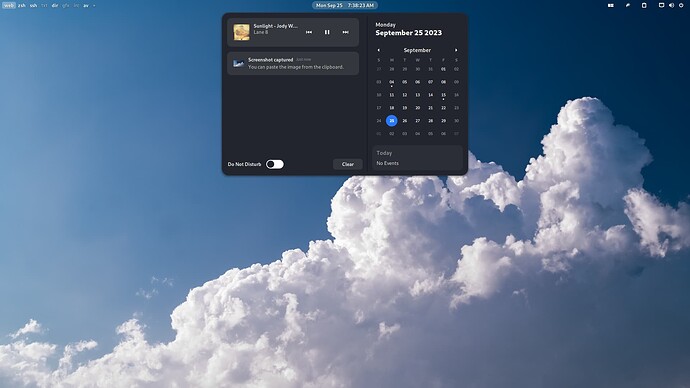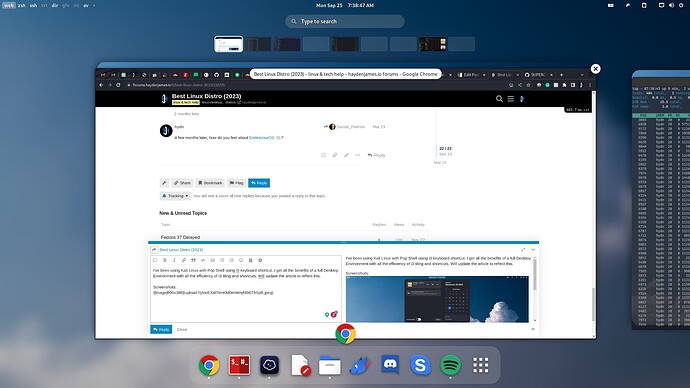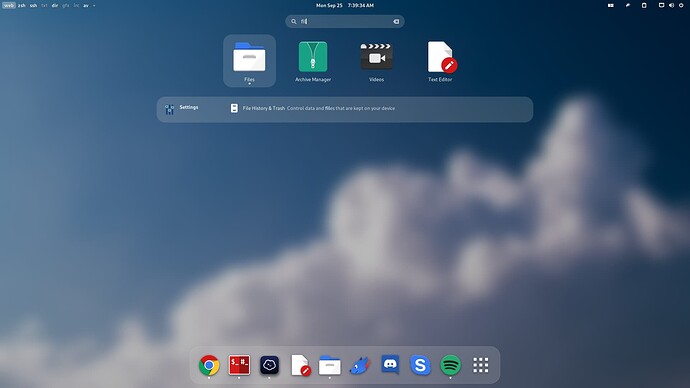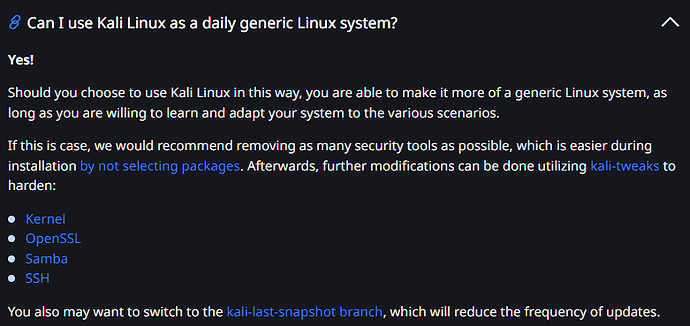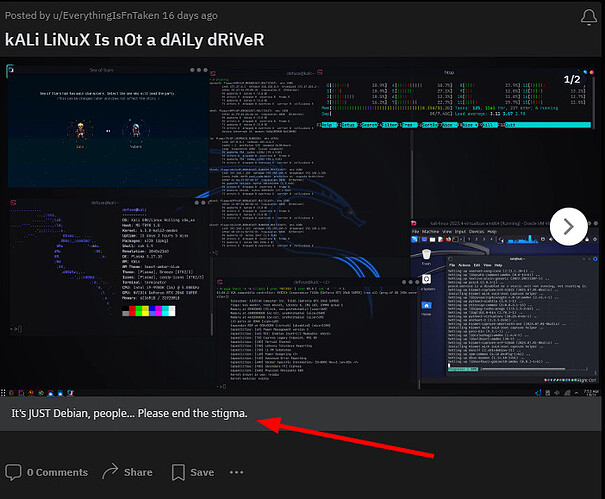I used debian based distros ( mostly mint) for many years. Last month i wanted to try endeavouros.
I love it. it is arch but with ease installation. I am a developer and need some software to be up to date and this rolling distro granted me updated software without losing time to add repositories.
I just type:
$ yay
and i have all system updated.
For now i can just advise to try it.
I love rolling releases also. Great suggestion. Thanks for joining our community. ![]()
I broke way too many rolling release distros lol
Agree, distro isn’t that important. More important is how old is the machine, and 32 or 64 bit.
One of the Ubuntu derivities is probably pretty good for the beginner. Much like windows, which they are probably coming from. I use Mint, and find it very easy to use and customize, and a great learning tool.
I also love Manjaro. Used to use it with xfce, but now with i3wm. If you know how to touch type and are a good typer - i3wm are probably great for you.
I think too many people get hung up on a particular package manager, but that shouldn’t be a problem…just take care and read the docs.
Not a bad choice. Just remember, there are a LOT of programs out there, and more than likely, since you are a “willing switcher”, you may find some great programs to help you do what you want.
Most important…USE HELP from individuals. Don’t be put off by the “RTFM” types. We’ve all start from scratch at one time or another.
After some months of endeavour os i can just confirm my impressions. It s a very good distro and i never felt the missing of mint. Mint is good too but sometimes i needed some software and i had to search a repository for a more recent version. Furthermore i keep using cinnamon. Cheers.
Now AntiX 22 version was updated on part of my recycled hardware, and runs fine. Also I have some problems with ati radeon on debian bullseye original version, that AntiX solves removing this kernel module. Next step, solve this problem on Debian or remove kernel module. Testing options related on this thread was next after solve ATI Radeon (AMD) problems ([AMD/ATI] Seymour [Radeon HD 6400M/7400M Series], gpu/drm/radeon.ko)
I’ve been using Kali Linux with Pop Shell using i3 keyboard shortcut. I get all the benefits of a full Desktop Environment with all the efficiency of i3 tiling and shortcuts. Will update the article to reflect this.
Screenshots:
I love linux mint. Its super clean and easy to install.
Kali is not a Linux distribution to use or to recommend as an operating system on bare metal. Except you are testing/learning penetration. Advice: Before hitting random download buttons on the net, at least read the description above those buttons. Kali description says “…penetration testing platform…” with a pretty LARGE font. So using Kali with a network connection, your data are exposed.
@Andrianos_Papamarkou @hydn i agree i dont like Kali linux and if you really want to go for the security tight linux with the sftp and everything defacto then go with the parrot os. https://www.parrotsec.org/ I havenot tried but build a docker for the simulation of the devops testing to estbalish a network swarm.
alles gut,
Gaurav
@Andrianos_Papamarkou welcome to the community. I don’t agree. Not at all.
Per Kali’s own website:
Kali Linux (is) Everywhere! | Kali Linux Blog - under the “daily driver” section. Quote:
Daily driver - Use the installer image and single boot Kali. With the docs and our forums you will be able to use Kali daily just fine with no worries. Be sure to follow the barebones install method!
…this is unfortunately misinformation. If you install Kali without pen test tools, you enjoy a stable and secure rolling Debian based distro, as I (and MANY others) have for many years. I LOVE Arch Linux, but personally, I do prefer rolling + Debian based = Kali without pen test tools.
Again from Kali Linux FAQ on their website:
Kali is the best penetration testing platform. By default is open, not secure. It is a nice VM toy for hackers.
@Andrianos_Papamarkou thank you and my field of interest and working is not penetration testing and hacking, so i dont have any idea about the same. Thank you for giving this knowledge share.
Did you read this? This answare actually say that you must install kali in a certain way and then heavilly tweak the distro to make it safe following 4 tutorials. That doubles that Kali IS NOT a regular distro but “the best penetration testing platform” as the official description say. This answer does NOT recommend kali for daily use. It clearly says that it could be done with some conditions.
I could add to this FAQ answer to un-block some security updates.
This distro should not be recommended to regular linux users as a bare metal operating system that handles personal data. This answer clarifies that Kali It is not safe for this.
@Andrianos_Papamarkou, You mentioned Kali is only for “testing/learning penetration” and that “using Kali with a network connection, your data are exposed,” suggesting it’s “not safe” for regular use. While I appreciate your perspective, it’s important to correct these misconceptions.
-
“testing/learning penetration”: While Kali is designed for penetration testing, it’s not limited to that use. The flexibility of many Linux distributions, including Kali, allows them to be adapted for various purposes. Kali, when installed correctly, becomes a more typical Debian-based distro, suitable for daily use. For example, Arch Linux, Gentoo, Slack, and other similar distros geared towards knowledgeable users require a bit more configuration and customization. That’s the beauty of Linux!
-
“using Kali with a network connection, your data are exposed”: The assertion that using Kali with a network connection exposes your data is misleading. Like any Linux distribution, Kali’s security depends on how it’s configured. Period. It’s about user proficiency and system configuration, not inherent flaws in Kali. As per your advice about reading, that’s key for anyone who wants to use Kali (and other distro) securely.
-
“Kali It is not safe for this”: Saying Kali is not safe for regular use overlooks the skills of Linux users who look into the many non-beginner distros such as Kali, Arch, Gentoo, Slackware, etc. Which is why it was correctly placed under the adv/expert subheading in the article.
The requirement for tweaks and customizations is common and welcomed in the Linux world, and doesn’t make Kali unsafe for personal data handling in any way. As such, for many, Kali is a secure and stable general and everyday system, and for likely most, it’s used exclusively or mainly for pentesting.
You’re basically doubling down on my words. We agree that Kali by default is not configured to be a secure system for bare metal handling of your personal data. It requires a lot of modifications and security management skills (to test those modifications) to comply with this specification.
I never said that an experienced security system administrator can’t turn Kali into a daily driver. I said that Kali (as is) is a distro set up as a penetration testing platform as the Kali developers describe on the official front page above the download button.
I also said that it should not be recommended as a normal operating system like Debian, RedHat, SE, Arch, Slackware, Solus, Mageia, etc. It can be disastrous for users who don’t fully understand the difference between a “Testing Platform” and an “Operating System”.
I agree that you have backtracked a bit and cleaned up the blanket false statements about Kali. Sorry, but I’m very fond of this distro and passionate about using and supporting it; so I don’t like to see the false narrative to scare others away from using it wisely.
Other than your follow-up messages which, yes, you try to agree with me. I still disagree with the original blanket statements:
No. Disagree.
Disagree. “Kali’s security depends on how it’s configured. Period.”
Again, I’ll refer you to more informed narrative and discussion around the web:
Quote:
" The bare metal installer exists for a reason, and I do believe that there are people who can benefit from using Kali as a "daily driver “. I think that more people need to at least acknowledge these things before giving advice to people, and also maybe tone it down with the elitism sometimes.”
We can agree on that. And agree on encouraging users to read direct from kali.org/faq/ and then decide for themselves and not just take the advice of others, including me. Which is why I shared such links above to more reading.
It’s the message, not the messenger. A lot of us Kali users are a bit sensitive to that “opening message”:
